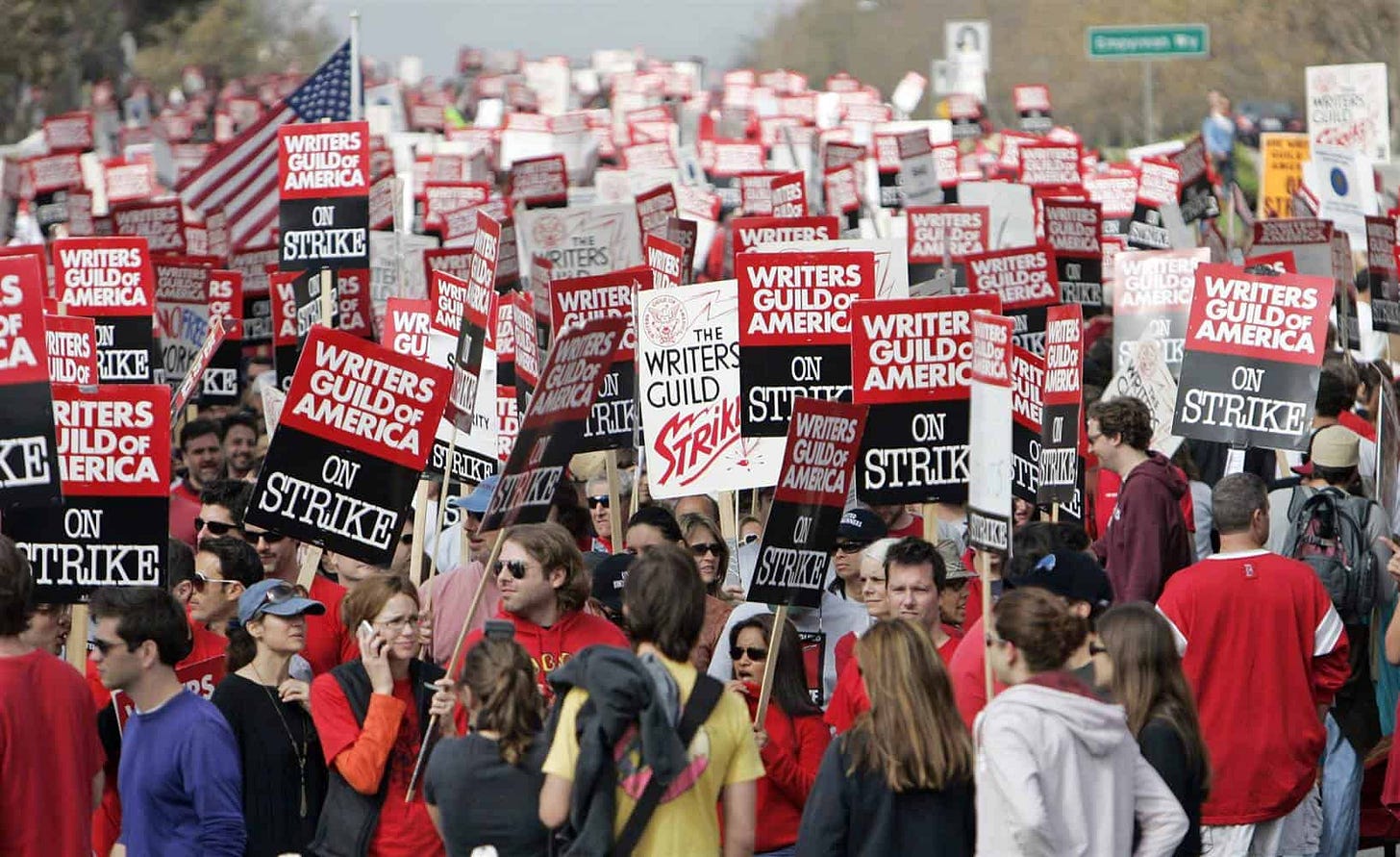From Film Script to Algorithm
Will AI Rewrite the Rules of Film and TV? The WGA/SAG strike rundown...
Hi! Hollywood stands at a crossroads. The recent Screen Actors Guild (SAG) and Writers Guild of America (WGA) strike against the Alliance of Motion Picture and Television Producers (AMPTP) throws the industry's future into question. While actors and writers fight for fair compensation and creative control, a new player enters the scene: artificial intelligence (AI) content generation.
Will AI writing tools become strikebreakers, flooding the market with scripts and stories? Will desperation drive studios to embrace AI-generated content as a cheaper alternative? And what does this mean for the future of traditional storytelling and the human artist's role within it?
AI Scribes on the Horizon:
The capabilities of AI in generating text are undeniable. Programs like LaMDA and GPT-4 can produce surprisingly coherent scripts and even mimic specific writing styles. While they may not match the depth and nuance of human-crafted narratives, they offer a fast and potentially cost-effective solution for content creation.
A Double-Edged Sword:
The potential influx of AI-generated content presents both opportunities and challenges:
Opportunities:
Faster Production: AI scripts can accelerate development, potentially speeding up film and TV production cycles.
New Genres and Formats: AI's ability to generate unconventional narratives might open doors for experimental formats and niche genres.
Accessible Storytelling: AI could democratize storytelling, making content creation more accessible for independent creators.
Challenges:
Human Connection: AI-generated stories often lack the emotional depth and authenticity of human-written narratives.
Job Displacement: Increased reliance on AI could lead to job losses for writers and other creative professionals.
Ethical Concerns: Issues like ownership, bias, and plagiarism need to be addressed before AI content becomes mainstream.
"The AI revolution is not about automating tasks, it's about automating the process of automating tasks.”
— Matthew Ball at the 2019 Web Summit in Lisbon
AI is already changing the future of work in the marketing and advertising industries.
I also talked about it my 2024 stack:
So…What is next?
Here’s the deal
Following a three-month strike for writers and a six-month strike for actors, in the last few months deals were finally signed between the unions and their respective members. Here’s the deal:
WGA Deal:
The Writers Guild of America (WGA) reached a tentative agreement with the Alliance of Motion Picture and Television Producers (AMPTP) in October 2023
Key points:
Streaming residuals: Writers will receive higher residuals for content streamed on platforms like Netflix and Hulu.
Wage increases: Minimum wages for writers will increase by 5% in the first year, followed by 4% and 3.5% in subsequent years.
Creative control: Writers gain more control over their work, including input on casting and editing decisions.
2. SAG-AFTRA Deal:
The Screen Actors Guild-American Federation of Television and Radio Artists (SAG-AFTRA) reached a tentative agreement with the AMPTP in December 2023, following a six-month strike.
Key points:
Streaming bonuses: Similar to the WGA deal, actors will receive bonuses for high-performing original streaming series and films.
Wage increases: Minimum wages for actors will increase by 3% in the first year, followed by 2.5% and 2% in subsequent years.
Health and pension benefits: Improvements to health and pension benefits for actors.
Both deals represent significant wins, addressing their concerns about streaming compensation, wages, and creative control. While they come with different specifics, they both signal a step toward a fairer and more secure future for film and television production workers.
The Deal Landscape in Flux:
The strike casts a shadow on future deal structures and content ownership. Traditionally, writers and actors hold substantial rights over their work. But with AI-generated content, who owns the intellectual property? Will studios push for contracts that exploit AI's potential while diminishing human creative contributions?
Navigating the New Normal:
As AI advances and the industry grapples with the strike's fallout, we must navigate this new landscape with careful consideration:
Human-AI Collaboration: Instead of viewing AI as a replacement, explore its potential as a collaborative tool that augments human creativity.
Fair Compensation and Rights: Ensure that content creators, both human and AI-assisted, receive fair compensation and ownership rights for their work.
Ethical Development and Use: Prioritize ethical considerations in AI development and utilization, promoting transparency and preventing bias.
The SAG-WGA strike is a crucial moment for Hollywood, forcing us to confront the changing landscape of storytelling and content creation. Embracing AI responsibly, advocating for fair deals, and cherishing the power of human creativity is key to navigating this transformation and ensuring a future where both artists and machines contribute to enriching narratives that captivate audiences around the globe.
Earlier this year on a dedicated podcast episode, I talked about the future of the job market in the marketing and advertising industry. With exponential development in AI, it seems it is so more prevalent today.
At the latest SXSW edition, this presentation praising AI was not well received by the crowd, to say the least.
This is just the beginning of the conversation. Let's engage in a thoughtful dialogue about AI's role in storytelling, protecting the rights of creators, and shaping the future of entertainment.
Connect with me on LinkedIn
Drop a comment below, and let me know your take 👇. You can subscribe here if you have not yet.
Listen🎙️ to the Brand Runner podcast on:
Also, drop me a line if you want to be featured on the podcast, and discuss a topic.






